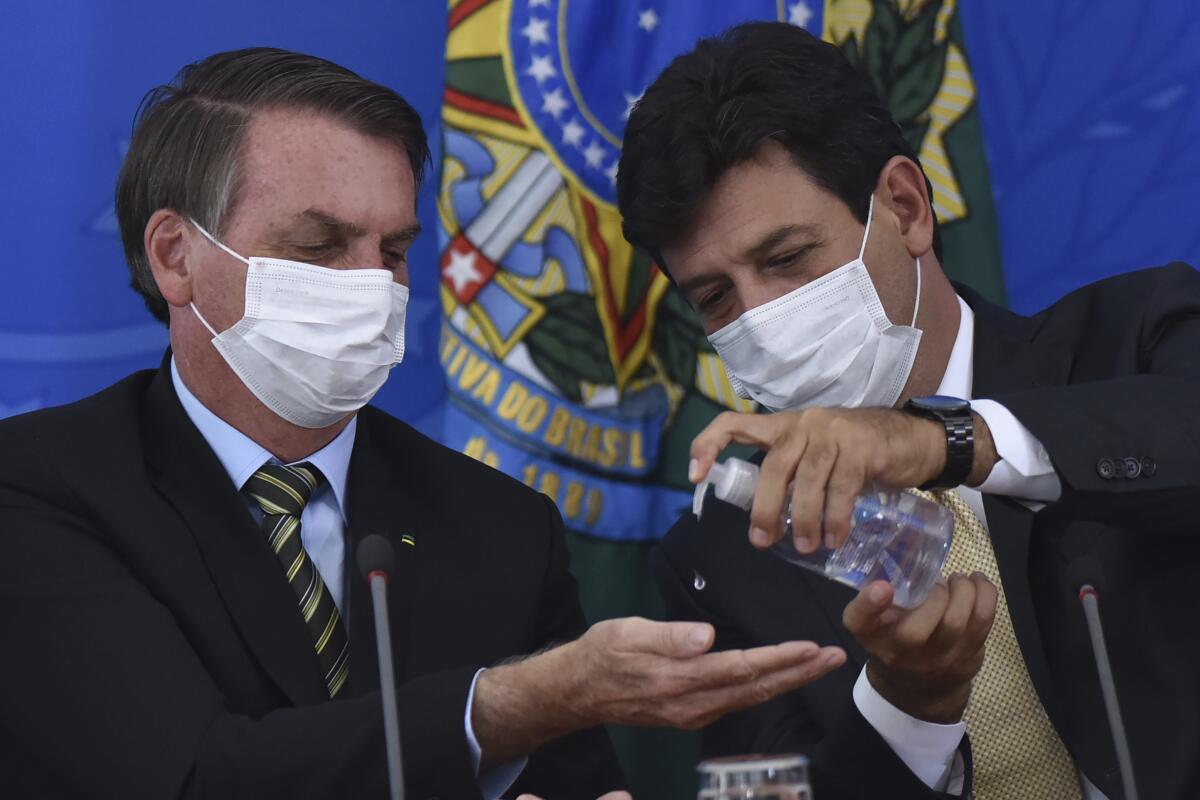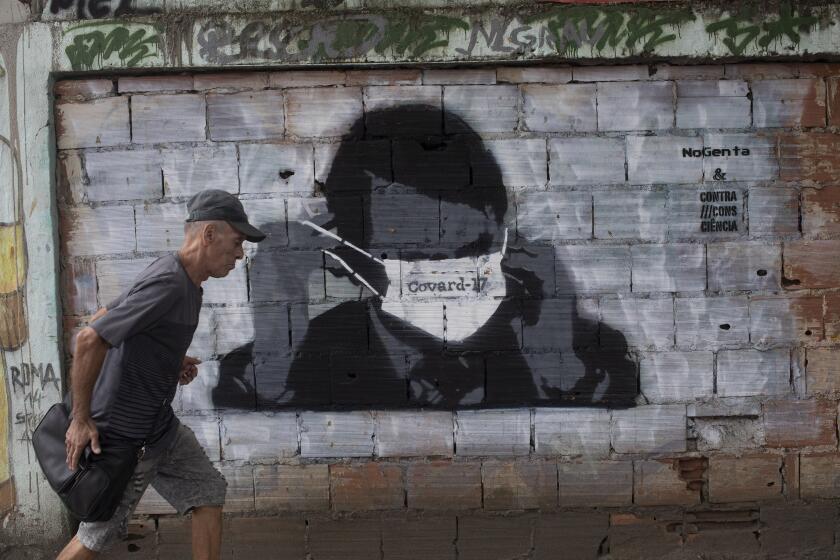Brazilian president fires health minister who called for stricter coronavirus precautions

MEXICO CITY — Brazilian President Jair Bolsonaro fired his health minister Thursday after a series of public clashes over the need for social distancing in response to the new coronavirus.
Bolsonaro, a right-wing nationalist who won election in 2018, has dismissed COVID-19 as “a little flu” and criticized media coverage of the pandemic as “hysteria.” He has urged Brazilians to ignore pleas from public health officials that they stay off the streets, saying it’s time for citizens to return to work for the sake of the economy.
Brazilian President Jair Bolsonaro, who has dismissed COVID-19 as “a little flu,” is losing support from longtime allies.
His health minister, Dr. Luiz Henrique Mandetta, had criticized Bolsonaro’s dismissive response to the pandemic, which has killed at least 1,924 Brazilians.
In televised interviews, Mandetta had urged the nation to disregard the president’s advice and follow the directions of state governors, most of whom have closed schools and urged nonessential workers to stay home.
Bolsonaro lashed out in response, saying, “Mandetta has to listen to the president more,” and warning, “None of my ministers are unfireable.”
In the midst of their public spat, Mandetta emerged with more popular support.
His approval rating shot up by 21 points to 76% since the onset of the crisis, according to a survey by polling firm Datafolha. The same poll put Bolsonaro’s approval rating at 33%.
Mandetta has been compared to Dr. Anthony Fauci, the infectious-disease specialist leading the U.S. response to the coronavirus. Fauci has at times publicly contradicted President Trump and has also done well in public opinion polls.
Mandetta announced on Twitter that Bolsonaro had fired him.
“I just heard from President Jair Bolsonaro the news of my dismissal from the health ministry,” he wrote.
At a news conference after the announcement, Mandetta urged his colleagues in the health ministry to continue supporting the social distancing measures implemented by the governors. “Do not do things one millimeter differently,” he said.
In an interview later in the day with Veja magazine, Mandetta aired his frustrations with Bolsonaro.
“You talk today, the person understands, says he agrees, then changes his mind and says everything differently,” Mandetta said. “You go, talk, it looks like everything is settled and then the guy changes his mind gain. Enough, right?”
Mandetta’s departure further isolates Bolsonaro, whose coronavirus response has earned him ire from several influential governors who once embraced his policies.
Lucas Barreto, a top representative of Bolsonaro’s government in the Senate, said Thursday that he was resigning in protest.
“I’m leaving because firing Luiz Henrique Mandetta is absurd,” he told journalists.
It was unclear whether the firing of Mandetta would change much.
“Bolsonaro is still under extreme pressure from business, Congress [and] others to moderate his approach,” tweeted Brian Winter, vice president for policy at the Council of the Americas think tank.
The man Bolsonaro announced to replace Mandetta as health minister, Nelson Teich, is a respected doctor who has advocated social distancing.
Speaking at a news conference Thursday, Teich said there would be no radical changes in the country’s efforts to combat the coronavirus. He vowed to make decisions based on technical criteria.
After the United States, Brazil has recorded the highest number of coronavirus deaths in the Western Hemisphere — although health experts say that severe undertesting means the true death toll could be much higher.
Many hospitals are already near capacity, and officials have warned that the nation’s healthcare system could become overwhelmed by the end of this month, with infections not expected to reach their peak until May or June.
Officials in hard-hit cities such as Sao Paulo and Rio de Janeiro have begun converting soccer stadiums into makeshift hospitals. Gravediggers are working overtime, burying as many as 60 bodies a day.
There is particular concern about the effect of the virus on the nation’s large indigenous communities, many of which are in remote areas, such as the Amazon basin, with minimal access to medical care. There are similar worries about potential outbreaks in the nation’s slums, known as favelas, where some 13 million people reside and basic sanitation, such as running water, is often limited.
Bolsonaro has said that social distancing guidelines could make life worse for the nation’s poor and that the nation’s economy cannot afford to be put on hold for months.
Though he often wears a surgical mask during news conferences, Bolsonaro has also made a point of going out in public without one. During a recent visit to a hospital, he waded into a crowd of supporters without a mask on and extended a hand for a fan to kiss.
More to Read
Sign up for Essential California
The most important California stories and recommendations in your inbox every morning.
You may occasionally receive promotional content from the Los Angeles Times.











